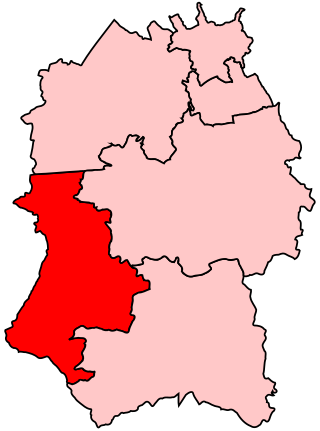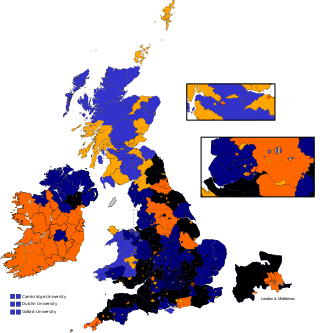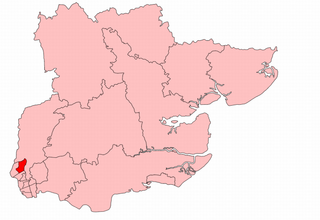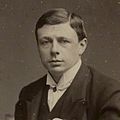
Westbury was a parliamentary constituency in Wiltshire from 1449 to 2010. It was represented in the House of Commons of England until 1707, and then in the House of Commons of Great Britain from 1707 to 1800, and finally in the House of Commons of the Parliament of the United Kingdom from 1801 until 2010.

Great Yarmouth is a constituency represented in the House of Commons of the Parliament of the United Kingdom since the 2024 general election by Rupert Lowe of Reform UK.

St Albans is a constituency in Hertfordshire represented in the House of Commons of the UK Parliament since 2019 by Daisy Cooper, a Liberal Democrat.

Stockport is a constituency represented in the House of Commons of the UK Parliament since 2019 by Navendu Mishra of the Labour Party.

South Shields is a borough constituency represented in the House of Commons of the Parliament of the United Kingdom. It elects one Member of Parliament (MP) by the first past the post system of election. It has been represented by Emma Lewell-Buck of the Labour Party since 2013.

Cambridge is a constituency represented in the House of Commons of the UK Parliament since 2015 by Daniel Zeichner of the Labour Party.

Dewsbury was a constituency created in 1868 and abolished in 2024.

Lincoln is a constituency in Lincolnshire, England represented in the House of Commons of the UK Parliament since 2024 by Hamish Falconer of the Labour Party.

Lichfield is a constituency in Staffordshire represented in the House of Commons of the UK Parliament since 2024 by Dave Robertson of the Labour Party.

Harwich was a parliamentary constituency represented in the House of Commons of the Parliament of the United Kingdom until its abolition for the 2010 general election.

Ipswich is a constituency represented in the House of Commons of the UK Parliament since July 2024 by Jack Abbott of the Labour Party.
Reading was a parliamentary borough, and later a borough constituency in England, represented in the House of Commons of the Parliament of England until 1707, the Parliament of Great Britain from 1707 to 1800, and of the Parliament of the United Kingdom from 1801 to 1950 and 1955 to 1974. Until 1885, the constituency comprised the town of Reading in the county of Berkshire; after 1885, it was centred on the town but the exact boundaries differed.
Paisley was a parliamentary constituency represented in the House of Commons of the Parliament of the United Kingdom from 1832 until 1983, when it was divided into Paisley North and Paisley South. These two constituencies were in turn amalgamated into Paisley and Renfrewshire South and Paisley and Renfrewshire North in 2005.

Greenwich was a constituency in south-east London, which returned at first two, then one member (MP) to the House of Commons of the UK Parliament. It existed from 1832 to 1997. Elections used the first past the post system; when this elects more than one member, it is sometimes called plurality-at-large voting.
Huntingdonshire was a parliamentary constituency covering the county of Huntingdonshire in England. It was represented by two members of Parliament in the House of Commons of England until 1707, then in the House of Commons of Great Britain from 1707 to 1800, and then in the House of Commons of the Parliament of the United Kingdom from 1801 to 1885. It was reconstituted as a single-member seat in 1918 and abolished once again in 1983.

Kidderminster was a parliamentary constituency in Worcestershire, represented in the House of Commons of the Parliament of the United Kingdom. It elected one Member of Parliament (MP) by the first past the post voting system.
King's Lynn was a constituency in Norfolk which was represented continuously in the House of Commons of England from 1298 to 1707, in the House of Commons of Great Britain from 1707 to 1800, and in the House of Commons of the United Kingdom from 1801 until it was abolished for the February 1974 general election.
Hertford was the name of a parliamentary constituency in Hertfordshire, which elected Members of Parliament (MPs) from 1298 until 1974.

Walthamstow East was a parliamentary constituency in what was then the Municipal Borough of Walthamstow in east London. It returned one Member of Parliament (MP) to the House of Commons of the Parliament of the United Kingdom, elected by the first-past-the-post voting system.
Kirkcaldy Burghs was a burgh constituency of the House of Commons of the Parliament of the United Kingdom (Westminster) from 1832 to 1974. It elected one Member of Parliament (MP) by the first-past-the-post voting system. From 1832 to 1950 it was, officially, a district of burghs constituency.




















